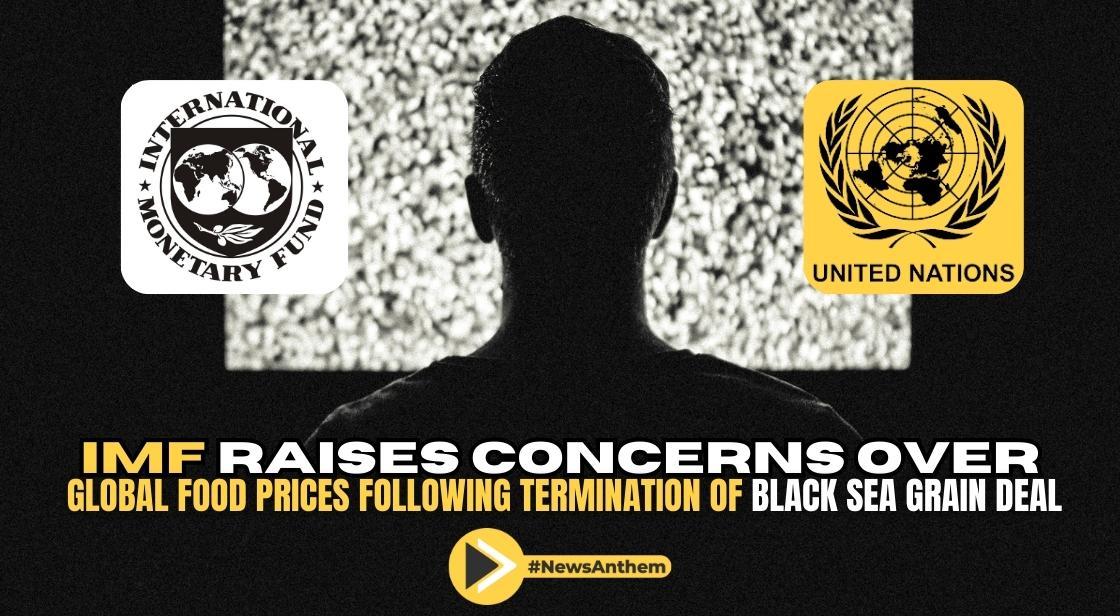IMF Raises Concerns over Global Food Prices Following Termination of Black Sea Grain Deal

News Synopsis
IMF Expresses Concern over Termination of Black Sea Grain Deal
The International Monetary Fund (IMF) has sounded an alarm over the abrupt termination of the Black Sea grain deal, brokered by the United Nations between Russia and Ukraine. The deal's termination poses a significant threat to global food security and may lead to surging food prices, particularly affecting poorer nations.
Impact on Global Food Insecurity
The Black Sea grain deal's discontinuation jeopardizes the food supply to countries that heavily rely on Ukrainian agricultural shipments, notably in North Africa, the Middle East, and South Asia. The IMF expresses concerns that this development will exacerbate food insecurity in these regions, making it challenging for vulnerable populations to access essential food supplies.
Risk of Global Food Inflation
The termination of the Black Sea grain deal is likely to have far-reaching consequences for international food prices. With the deal playing a crucial role in facilitating grain and fertilizer exports from Ukraine to the global market, its absence may exacerbate food inflation, especially for low-income countries that are already grappling with economic challenges.
Importance of the Black Sea Grain Deal for Global Food Security
The IMF acknowledges the significant role played by the Black Sea grain deal in supporting global food security. The agreement enabled safe passage for Ukrainian agricultural exports through the Black Sea, easing the pressure on international food prices and ensuring a stable supply of essential food commodities.
Monitoring the Situation and Potential Impacts
As the termination of the grain deal unfolds, the IMF pledges to closely monitor the situation and assess its impact on global food security. The organization recognizes the vulnerability of countries that heavily relied on the deal and aims to address potential food crises effectively.
Russia's Decision to Terminate the Grain Deal
Moscow announced its decision to terminate the Black Sea grain deal, citing the other parties' failure to meet their commitments regarding Russia's agricultural exports. The deal was part of a Russia-UN memorandum, which sought to ease sanctions affecting Russian exports and facilitate agricultural trade.
However, key demands outlined in the memorandum, such as SWIFT reconnection for Rosselkhozbank and facilitation of agricultural machinery spare parts deliveries, remain unfulfilled.
Russia's Willingness to Assist Low-Income Countries
Despite terminating the grain deal, Russia has expressed its readiness to provide grain supplies to low-income countries that are most affected by food insecurity, free of charge. This gesture aims to alleviate the impact of food shortages in vulnerable regions.
What is Black Sea grain deal?
The Black Sea grain deal was a UN-brokered agreement between Russia, Ukraine, Turkey, and the United Nations that would have allowed for the safe passage of up to 25 million tons of Ukrainian grain per month through the Black Sea. The deal was signed on June 13, 2023, but was terminated by Russia on July 20, 2023.
The deal was designed to alleviate the global food crisis that was caused by the Russian invasion of Ukraine. Ukraine is a major exporter of wheat and other grains, and the war has disrupted its exports, leading to a sharp rise in global food prices.
The deal called for the establishment of a safe corridor through the Black Sea for ships carrying grain from Ukraine. The ships would be inspected by Turkish and Russian officials before being allowed to pass through the corridor.
The deal was met with mixed reactions. Some countries welcomed the deal, while others expressed skepticism about its ability to be implemented. Russia had previously accused Ukraine of mining the Black Sea, which made it difficult for ships to pass through the area.
The termination of the deal is a major setback for global efforts to address the food crisis. The UN has warned that the termination of the deal could lead to a global food crisis, with prices of wheat and other commodities rising sharply.
The IMF has also warned that the termination of the deal could exacerbate global food insecurity and lead to surging prices, especially in poorer nations.
The future of the Black Sea grain deal is uncertain. It is possible that the deal could be renegotiated, but it is also possible that it will be abandoned altogether. The outcome of the war in Ukraine will likely play a major role in determining the fate of the deal.
some additional facts about the termination of the Black Sea grain deal:
-
The deal was initially agreed to on June 13, 2023, after weeks of negotiations between Russia, Ukraine, Turkey, and the United Nations.
-
The deal would have allowed for the safe passage of up to 25 million tons of Ukrainian grain per month through the Black Sea.
-
The deal was terminated on July 20, 2023, after Russia accused the other parties of not meeting their commitments.
-
Russia has demanded that the other parties lift sanctions on its agricultural exports in order to return to the deal.
-
The IMF has warned that the termination of the deal could lead to a global food crisis, with prices of wheat and other commodities rising sharply.
Conclusion
The termination of the Black Sea grain deal raises significant concerns for global food security and pricing. The IMF's alert highlights the potential risks that poorer nations may face in accessing essential food supplies, further exacerbating food insecurity in already vulnerable regions.
As the situation unfolds, the IMF remains vigilant in monitoring the developments and working towards mitigating the adverse effects of the deal's discontinuation on global food prices and accessibility.









